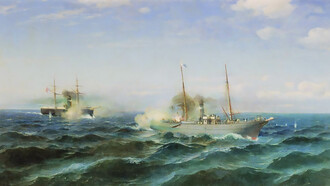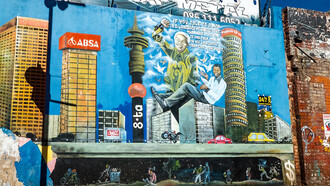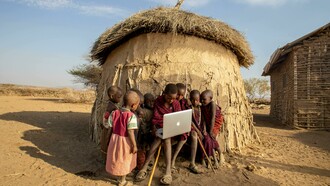The Green March was an innovative and creative approach of Morocco to recover its southern provinces and in lieu of a real referendum on the Moroccan Sahara.
This event was unique compared to traditional methods of resistance for freedom and independence and the fight against occupation. The Kingdom has faced various colonialist desires including those of Spain in the north and the south and of France in the east, west and center of the Kingdom. If the negotiations have helped to end the French occupation, this process could not be completed with the Spanish occupier led by General Franco, who persisted in his determination to continue to occupy the Moroccan Sahara.
The obstinacy of Spain and its denial of the legitimate rights of Morocco in its territories by claiming that the Sahara was "terra nullius" led Morocco to ask the Security Council to submit this case to the International Court of Justice to rule on the existence of links between the Kingdom and its southern provinces. The International Forum has recognized in its advisory opinion of 16 October 1975 that there was, indeed, legal ties of allegiance between Morocco and the Sahara, as well as international agreements, including those with Britain, recognizing the sovereignty of the Kingdom of the Sahara.
With this recognized legitimacy, Morocco organized a memorable peaceful march, with the participation of thousands of Moroccans from all regions of the Kingdom, to break down the fake borders and liberate the Sahara from the Spanish occupation.
Forty Years After the Green March Transformed a Desert Region to Cities
Forty years after the Green March, the balance sheet of achievements in the development of the southern provinces is considerable. Morocco has made huge efforts to put these provinces abandoned during the Spanish occupation in the rest of the country.
From a desert where there was no infrastructure, where the meager populations were abandoned, where health care and education were non-existent, Moroccan efforts have enabled the development of territories now have roads, airports, ports, cities, health services, schools, water desalination plants, electric networks. New resources have been made of value including fishery resources, renewable energy and tourism.
The economic development of the southern provinces is a reality that has been possible thanks to the political will of the monarchy and mobilization of the whole Moroccan society. The aim was to bridge delays, as has been done in other regions of the Kingdom (eg North and Oriental), so that everyone can participate in the onward march of Morocco.
While the Arab world knows a large scale crisis, threatened by separatism and divisions, the successful reunification of Morocco as part of a large national renewal and global development project is one of the few grounds hope. Therefore, the conflict maintained by Algeria, which since 1975 tries to create a puppet separatist movement (Polisario) in the Moroccan Sahara.
The international community should supports Morocco, offering a realistic and credible solution, and clearly invite Algeria to put an end to a provoked conflict resulting in the jeopardy of the security in the Sahel-Saharan region where as it could be a fertile ground giving birth of extremist and terrorist groups. The terrorist groups operating in the Sahel-Saharan region, AQIM and MUJAO, have constant and strong relationships with Polisario including military training and secret armament.
Moroccan Autonomy Plan to Stabilize the Sub-Saharan region
The Moroccan autonomy proposal in the southern provinces remains the only plausible solution to the conflict over the Moroccan Sahara ensuring the stability of the Sahel-Saharan region. The Great Sahara now lives extreme tension. Morocco is one of the best countries in the Mediterranean and the Sahel to provide excellent stability on both Arab and African levels instead of other proposals that might only lead to extreme tension and instability that both Europe and the rest of the world don’t need.
The southern provinces know great and steady development thanks to the enormous efforts made by Morocco. Formerly abandoned to their fate during the period of Spanish colonization, the southern provinces have completely changed its face today. This celebration is an opportunity to highlight the significant achievements made by Morocco to develop its southern provinces.
Morocco King Speech Gives Answer to UN process deadlock
The speech of the King Mohammed VI on the occasion of the fortieth anniversary of the glorious Green March, provides a strong response to all attacks carried out by the parties hostile to the interests of Morocco, including Algeria and the Polisario.
The speech focused on three fundamental axes pertaining to the internal, regional and international situations. Internally, the King gave an explicit answer as to the deadlock in the UN process, stressing that Morocco has made major advances at the political level in favor of the active implementation of the advanced regionalization which is reflected by deep conviction and a strong participation of the population of the Sahara to the elections and the choice of their representatives, and also at the implementation of the proposals of the Economic, Social and environmental council, concerning projects started that indicate access to a new stage marked by investment and major projects.
Regionally, the King has conducted a careful analysis of what happens in Tindouf, both in terms of the situation of the population at the level of leaders of the Polisario and the role of Algeria, these outrageous of the said leaders are supported by facts and proofs. The people in Tindouf concentration camps are living in terrible conditions, while humanitarian aid of more than 60 million Euros a year are diverted to the leading people of Polisario who have real estate, funds and bank accounts in Europe and Latin America.
Internationally, the Sovereign noted that the stalemate in the UN process is intended. The king has asserted that the Kingdom will no longer make concessions and that autonomy initiative, presented in 2007, is the maximum that Morocco has to offer.















